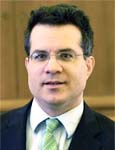“No evidence exists of any serious threat of voter fraud, at present or in any recent election cycle,” says Greg Magarian, J.D., election law expert and professor of law at Washington University in St. Louis. The current cries of “fraud” focus on the Association of Community Organizations for Reform Now (ACORN), a public interest organization that advocates for low- and moderate- income and minority citizens. ACORN employees in some localities have submitted false registration forms alongside legitimate ones.

“The dire warnings about fraud rest almost completely on these false forms,” Magarian says. “ACORN appears to have cooperated fully with investigations of its registration practices and initiated efforts to find and eliminate the bad actors in its midst. More importantly, filing false registration forms does not constitute voter fraud. Voter fraud requires voting by a person who is not legally entitled to vote. That is a difficult trick to pull off, and simply turning in a registration form for ‘Captain Crunch’ does almost nothing to enable it.”
Magarian notes that organizations – including the major political parties – pay people to register voters, and false forms are a fairly common problem.
“Some paid solicitors try to pad their numbers or ease their labor by filing false forms,” he says.
“In other cases, false forms probably result from mischief by people the solicitors approach. The legal status of filing false registration forms varies by state, but the practice is generally illegal. The problem with false forms, however, has much less to do with any danger of voting fraud than with making unnecessary work for election officials.”
Every state can set its own rules for registration and the conduct of voting.
“If Democrats prevail – not just at the presidential level but also in key Senate, House, and state-level races – Republicans may try to use the fallacious “fraud” premise to discourage and interfere with voting in heavily Democratic areas and to challenge votes after the fact where state laws permit,” Magarian says. “How fully they succeed will depend on the integrity of state election officials. The stakes could hardly be higher.”
Editor’s note: Magarian is available for phone, e-mail and broadcast interviews. Washington University has VYVX and ISDN lines available free for news interviews.